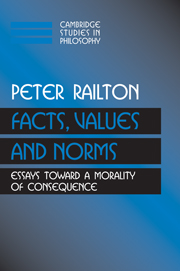Book contents
- Frontmatter
- Contents
- Foreword
- Part I Realism about Value and Morality
- Part II Normative Moral Theory
- Part III The Authority of Ethics and Value – The Problem of Normativity
- 10 On the Hypothetical and Non-Hypothetical in Reasoning about Belief and Action (1997)
- 11 Normative Force and Normative Freedom: Hume and Kant, but Not Hume Versus Kant (1999)
- 12 Morality, Ideology, and Reflection; or, the Duck Sits Yet (2000)
- Index
10 - On the Hypothetical and Non-Hypothetical in Reasoning about Belief and Action (1997)
Published online by Cambridge University Press: 18 December 2009
- Frontmatter
- Contents
- Foreword
- Part I Realism about Value and Morality
- Part II Normative Moral Theory
- Part III The Authority of Ethics and Value – The Problem of Normativity
- 10 On the Hypothetical and Non-Hypothetical in Reasoning about Belief and Action (1997)
- 11 Normative Force and Normative Freedom: Hume and Kant, but Not Hume Versus Kant (1999)
- 12 Morality, Ideology, and Reflection; or, the Duck Sits Yet (2000)
- Index
Summary
I am sure that I do not understand the idea of a reason for acting, and I wonder whether anyone else does either.
Philippa FootPerhaps it shouldn't be surprising when a central notion of common sense proves elusive on reflection – that's what makes the philosophical world go round. And some aspects of practical rationality seem obvious enough: rational agents form intentions, adjust means and ends, and so on. Yet even very elementary questions can excite not only controversy between conflicting, entrenched positions, but also expert bafflement.
An indirect approach suggests itself: it might help us to understand reasons for action if we started with reasons for belief. First, action involves belief. Second, one of the most crucial and problematic notions in practical reason – the notion of non-hypothetical reasons or requirements (reasons or requirements not dependent upon contingent ends of the agent) – appears to be well domesticated within the literature on theoretical reasons. On the usual view of things, two agents in the same epistemic situation (same evidence, same background beliefs) would have the same reasons for believing any given proposition, regardless of possible differences in their personal goals.
Can the “usual view of things” in the theoretical realm be given a principled basis? If so, can a similarly non-hypothetical basis be found in the practical realm? In what follows, we will be developing a sequence of arguments that purport to show just this. These arguments turn on considerations concerning belief and action of a kind David Velleman has called constitutive.
- Type
- Chapter
- Information
- Facts, Values, and NormsEssays toward a Morality of Consequence, pp. 293 - 321Publisher: Cambridge University PressPrint publication year: 2003
- 8
- Cited by

